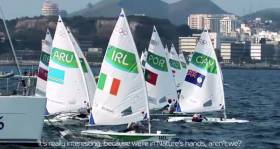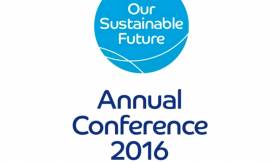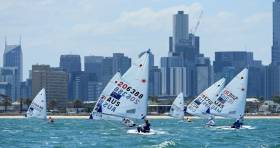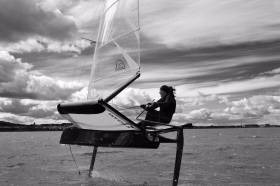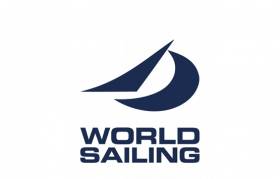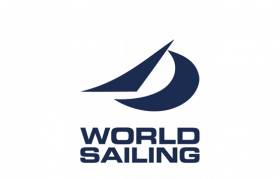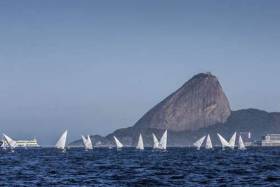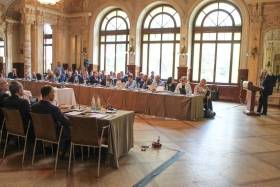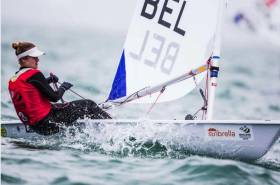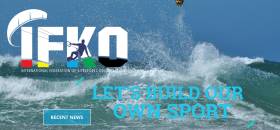Displaying items by tag: World Sailing
Sailing: Sport, Nature & Technology in Perfect Harmony – World Sailing's New Strategic Plan
World Sailing has announced a new strategic positioning for the sport, expressed in a 'new, fresh and modern brand identity'.
A stronger and more contemporary visual identity alongside a new vision and mission puts sport, nature and technology at its core and fully completes the transition from the International Sailing Federation (ISAF) to World Sailing which commenced in November 2015.
The new brand identity has been rolled out across World Sailing's digital properties alongside the release of a short film highlighting sailors, coaches, sailing fans and sports fans reinforcement of the new positioning. Annalise Murphy and other Irish sailors feature in World Sailing's new video to set out the world governing body's new 'strategic position' Click here to view the film.
World Sailing's Vision and Mission:
Vision: A world in which millions more people fall in love with sailing; inspired by the unique relationship between sport, technology and the forces of nature; we all work to protect the waters of the world.
Mission:
To make sailing more exciting and accessible for everyone to participate or watch; and use our reach and influence to create a sustainable future for our sport and the waters of the world:
• To create, and regulate, exciting competition events to showcase the natural power of wind driven water sport;
• To build a strong profile and image for sailing – using our key points of difference to resonate with people and give them a lifetime of sport;
• To create a tangible sustainability programme that maximises the positive effect that the sailing community can have on our environment.
All of this can be encapsulated in a simple message: sport, technology & nature in perfect harmony.
World Sailing CEO Andy Hunt commented, "World Sailing has to adapt and seize opportunities and our new positioning captures both the substance and emotion of why we all have a passion for sailing.
"A more contemporary brand identity for World Sailing represents our new proposition to ensure we stand out in what is a very crowded marketplace and provide us with the flexibility to meet the communication needs of a modern, complex, multi-channel organisation.
"We hope that new brand identity will resonate well with fans, sponsors and the sailing community and captures the collective desire of Sailors to be the guardians of the Ocean.”
At World Sailing's 2016 Annual Conference in Barcelona, Spain the new brand will come to life, enabling the sailing community to explore how to maximise the impact of the new Vision and Mission.
Sailing will be laying down plans for a healthy sustainable future for the sport, as well as the more specific subject of sustainability in the waters of the world. The dialogue and engagement will be centred on an overarching theme of, 'Our Sustainable Future'.
World Sailing's 2016 Annual Conference: 'Our Sustainable Future'
World Sailing's Annual Conference is the central meeting point where the strategy of sailing is reviewed, discussed and celebrated. For the 2016 Annual Conference, the dialogue and engagement will be centred on an overarching theme of, 'Our Sustainable Future'. Sailing will be laying down plans for a healthy sustainable future for the sport, as well as the more specific subject of sustainability in the waters of the world.
The 2016 Annual Conference, will be held in Barcelona, Spain from 5-13 November; welcoming up to 700 delegates. They will range from International Class Associations representatives, Member National Authorities officials and Committee Members to leading Sailors, Event Organizers, Boat Manufacturers and Observers.
As part of the theme, three new Forums – Sustainability, Commercial Strategy for the Sport and Para World Sailing – have been introduced into the Conference programme. The Forums will feature world leading experts and panel discussions, providing the basis for debate around sustainability across multiple facets of the sport.
The Forums will be open events and will also be streamed live on the World Sailing website, combining social media feeds to enable virtual interaction around the world.
World Sailing CEO Andy Hunt commented, "The introduction of three new forums to World Sailing's Annual Conference is the start of a process to modernise the meeting into a professional, engaging and interactive event.
"Under the overarching theme of Our Sustainable Future, delegates will be able to engage, share best practice, be inspired to make positive change and make our sport more sustainable from a number of dimensions.”
About the Forums:
Forum 1– Monday 7th November, 1430-1830 – Sustainability
Keynotes speakers include: Julia Palle (Sustainability Manager Formula E), Susie Tomson (Sustainability Manager Team BAR), Anne-Cécile Turner (Director Blueshift), Kelli Jerome (CEO Golf Environment Organisation), Jill Savery (CEO at Bristlecone Strategies) and Andy Hunt (CEO World Sailing)
Forum 2 – Tuesday 8th November, 1430-1730 –Para World Sailing
Keynote speakers include: Geoff Holt MBE (Founder Reinstate), Ms. Külli Haav (Noblessner Yachtclub Sailing School, Estonia), Sarah Treseder (CEO RYA), Ms. Emma Hallén (Trim the Sails Foundation, Sweden), and Massimo Dighe (Para World Sailing Manager)
This Forum will include an interactive working session and will be open to all conference attendees.
Forum 3 – Wednesday 9th November, 0930-1330 – Commercial Strategy for the Sport
Keynote speakers include: Mark Turner (CEO Volvo Ocean Race), Jerry Newman (Head of Sports at Facebook), Ulrich Lacher (Lacher Consulting) and Hugh Chambers (CCO World Sailing)
The three Forums will be mixed in with a full schedule of Committee, Sub-committee and Commission meetings over the period of the conference and the recommendations of these groups will go to World Sailing's Council on 11 and 12 November.
Concluding the Annual Conference on Sunday 13 November will be the General Assembly, a four-yearly meeting that will decide the Board of Directors (President and Vice-Presidents) for the next four years.
A full World Sailing 2016 Annual Conference Schedule can be found here
New Sailing World Cup Strategy Snub to Southern Hemisphere
Irish sailors on the campaign trail for the Tokyo 2020 Olympics will not need to pack bags to compete for World Cup honours in Australia any time soon following a decision by World Sailing not to visit the southern hemisphere as part of its series. Up until now the world–girdling event had a regatta in Melbourne.
Australia Sailing has expressed its disappointment in elements of World Sailing’s new strategy and format for the Sailing World Cup released earlier this week.
The new Series format has no Southern Hemisphere venues scheduled for the next four years, with only the possibility of an opportunity in 2018. The immediate impact is that this year’s Sailing World Cup event in Melbourne will be the last after nine successful years.
Australian Sailing CEO Matt Carroll said, “We support World Sailing’s plan to create a long-term strategy and certainty in the sailing calendar and to build closer ties with the Olympic classes. However, with Melbourne now removed from the Series, World Sailing has effectively snubbed the Southern Hemisphere with their showcase event.”
“World Sailing has been pushing for sailing to be an inclusive global sport, but the exclusion of the Southern Hemisphere as a host venue for the Sailing World Cup would seem to be a backward step”, Matt added.
At the recent Rio Olympic Games, Australia and New Zealand shared the honour of the highest medals per country with four each, and four of the top 10 countries in the medal tally were from the Southern Hemisphere.
Sailing World Cup Melbourne Organising Committee Chairman, Mark Klemens said, “Like many, we were surprised by the announcement that unfortunately no longer includes the Southern Hemisphere in this pinnacle global series. While we have enjoyed working closely with World Sailing to assist in the creation and development of the Sailing World Cup since its inception, we are disappointed that the new series format doesn’t include Australia and in particular Melbourne.
“I particularly wish to thank the State Government of Victoria who have been longstanding and generous supporters of this event and the sport of sailing since 1991, the Melbourne Clubs and other stakeholders. We will deliver an outstanding and memorable Sailing World Cup Final this December and look forward to a new direction for Melbourne and its support of other major sailing events”, Mark added.
Matt Carroll joined Mark in thanking the Victorian Government for their investment in sailing. “There is no doubt that this investment has supported the Australian Sailing Team’s recent success at the Olympic Games in London and Rio.
“While we are disappointed by the decision to move all the of the Sailing World Cup Series to the Northern Hemisphere, we will do all we can to ensure our sailors are given the best chance to compete on a level playing field. Tokyo 2020 is not far away and every opportunity will be utilised to prepare them for the next Olympic Games”, Matt said.
The President of the governing body of International Sailing has spoken about the possibility of a foiling boat in the OIympic Sailing line–up for Tokyo 2020. In a far reaching interview with Scuttlebutt's Craig Lewick, World Sailing's Carlo Croce also says that sailing is one of six sports under review for the 2020 Games. It looks certain therefore that there will be changes in the sailing classes, something World Sailing, according to Croce, is hoping to keep to a minimum as the International Olympic Committee (IOC) looks for 'spectacular' events.
'I think in November we will be able to announce good news to the Council, but at the moment we’re still confidential because the IOC has not yet formally decided. Maybe kiteboard, maybe foiling boat… I don’t know. Perhaps an old hobby of mine – a long distance race with very simple and basic one design boats with no extreme equipment', Croce said.
The choice of a foiling boat, such as the Moth class, might be looked on favourably by Ireland as Olympic silver medalist Annalise Murphy, in the Laser Radial class, is also a keen foiling dinghy sailor. Annalise has already finished second in the Women's world Moth championships, a pioneering international foiling class with 15 boats sailing in Ireland.
'We decided to ask our members to vote for what we call the unlock vote, which meant we had to unlock the decision taken four years ago to keep the same Olympic events from the 2016 Games to the 2020 Games. We were pushed hard by the IOC to move forward to a more spectacular program, and they just give you – very quickly – two figures: 10,500 athletes in Rio and in London. This is the number they don’t want to change. There will be five new sports in Tokyo and six current sports under review, not for pushing them out, but to look what they can do for improving, and sailing is amongst the six' said Croce.
Croce also told Scuttlebutt 'We could pick up one man and a girl and put them in an offshore boat… just a personal thought. I am completely convinced we’d find someone who can find provide the boats to the Olympics free of charge. It could also be a way for people competing in a dinghy class to also participate in the offshore race and compete for two medals, which our sport never had. That could be interesting'.
But nothing is decided. It’s not me who will decide; it will be the Council. Certainly there will be changes, but what I want to really say is we will do absolutely the minimum changes we can not to have people throwing away all of their boats and our member nations being in trouble. So the changes yes, but just the minimum we need to. Our member nations have to design a program of four years, so we need to be quick.
Read the full interview on Scuttlebutt here.
Annalise Murphy will be given a civic reception tomorrow in Dun Laoghaire. Details here.
World Sailing Struggles With Presenting Rio Sailing Results
#Rio2016 - World Sailing continues to struggle with presenting the results of the Olympic Regatta.
The normally very efficient system that brings the World Cup results seems to have failed at a crucial moment.
The issue seems to be an inability to calculate the overall totals and sort them into leader order.
Interestingly, the workaround that World Sailing has put in place is to direct browsers to the official Rio results site.
Here, too, there are issues as this site does not show how discards figure in the overall total.
However, Afloat.ie has discerned that the World Sailing system seems to be operational again and can be accessed HERE.
Users are advised to save that link, as clicking on the other hyperlinks on this page may take you to the official Rio 2016 results site.
Protest decisions are also available through the same link. However, World Sailing fails to indicate which fleet the protest applies to, so there is a bit of guesswork involved in working out which event is affected by the protest.
#Rio2016 - World Sailing has provisionally confirmed six Russian sailors for the Olympic Games that kick off next Friday in Rio.
Following a conference call yesterday (Tuesday 26 July) with its board of directors in the wake of the damning McLaren report on doping in sport, the world governing body for sailing confirmed the eligibility of RS:X competitors Stefania Elfutina and Maksim Oberemko, 470 sailors Liudmila Dmitrieva, Alisa Kirilyuk and Denis Gribanov, and Laser helm Sergey Komissarov.
All six are currently in Rio preparing for the games.
Gribranov's sailing partner Pavel Sozykin was denied eligibility based on the findings of the McLaren report, but World Sailing has recommended that the Russian Olympic Committee will have the opportunity to nominate a last-minute replacement.
These provisional confirmations are subject to approval by the Court of Arbitration for Sport (CAS).
"The World Sailing board of cirectors carefully considered all relevant factors in making these determinations, including the guidance provided by the IOC, the results of the McLaren Investigation Report and our own rules and procedures," said Andy Hunt, World Sailing CEO.
"This is unprecedented territory for international sport as, collectively, we work to protect the integrity of sport and remain resolute in our commitment to eliminate doping. These efforts must be balanced with principles of fairness, due process and adherence to established rules.
"There is, however, no room in sailing for athletes who seek to gain an unfair advantage through the use of banned substances or who attempt to manipulate or subvert the anti-doping system. For World Sailing, there is no greater priority than protecting and preserving clean competition.”
The news comes after all but six Russian rowers were barred from the Rio games over the McLaren findings, as previously reported on Afloat.ie.
With less than 75 days to go until the opening of the Rio 2016 Olympic Games, World Sailing Chief Executive Officer Andy Hunt and Head of Competitions Alastair Fox this week participated in a final on-site review of preparations for the Olympic Sailing Competition.
Briefings were provided over two days on key operational and service areas for the Olympic Games, including venue construction, competition schedules, broadcasting, media operations, accommodation, transportation and ticketing. A detailed briefing was also provided on the continuing efforts to improve water quality in and around Guanabara Bay, the venue for Olympic Sailing.
The briefings were led by Rio 2016 Sport Sailing Manager, Walter Boddener, and his operations team. Hunt and Fox were joined by Darryl Seibel, who will serve as Chief Press Officer for World Sailing during the Rio 2016 Olympic Games.
The World Sailing delegation also met with Rio 2016 security officials to learn more about steps that can be taken to increase safety for athletes and coaches, particularly during pre-Games training periods. This advice will be shared directly with World Sailing Member National Authorities, according to Hunt.
"We appreciate the work being done by Rio 2016 and its partners to welcome the best sailors from around the world for the 2016 Olympic Games,” said Hunt. "Since our last visit in March, considerable progress has been made in preparing for the Olympic Sailing Competition. Construction at the Marina da Gloria is almost complete and the water quality is noticeably better, particularly in the launch areas around the marina.
"During our review, we had an opportunity to meet with officials from the Mayor's Office and leading environmental authorities to review their latest water-quality data,” added Hunt. "The trend lines are encouraging, but it will be important that not a single day is lost in implementing the remaining measures that are planned, including the installation of a series of new eco barriers.”
"Our primary focus is to make certain the field of play on Guanabara Bay is safe and suitable for all Olympic competitors,” said Fox. "Working with Rio 2016 and various governmental authorities, I'm confident we have the right plan in place to deliver a field of play that is safe and fair. Equally, as with every major sailing regatta, we have detailed plans in place to respond and adapt should conditions change.”
The natural beauty of Rio de Janeiro will provide a spectacular backdrop for sailing, which will enjoy a particularly bright spotlight during the upcoming Olympic Games.
"Brazil has enjoyed tremendous success in Olympic sailing and athletes such as Robert Scheidt, Torben Grael and Marcelo Ferreira hold a special place in Brazil's sporting culture,” said Hunt. "Given this history of success and the profile sailing enjoys in Brazil, it is our hope that the beaches surrounding Guanabara Bay will become one of the truly special places for fans during the Rio Games.”
World Sailing has laid out a draft two-year roadmap for continued 'good governance' based upon a consultation with member national associations and stakeholders at its Mid-Year Meetings in Lausanne, Switzerland.
World Sailing members approved this weekend a number of changes to its constitution and regulations, which mark the start of the implementation of the modernisation plan.
World Sailing's Constitution concerning non-discrimination is now in line with the Olympic Charter. World Sailing will promote the sport of sailing in all of its branches regardless of colour, gender, physical ability, sexual orientation, language, religion, political or other opinion, national or social origin, property, birth of other status;
The Executive Committee will now be referred to as the Board of Directors of the Federation;
The Secretariat will now be called the Executive Office;
The Chairman of the Athletes' Commission is now a permanent voting member of the Board of Directors;
Future venues of the Annual Conference and Annual General Meeting will be determined via a bidding process and vote by members at the AGM;
Strengthened procedures for identifying and managing conflicts of interest.
The governance of International Federation's (IFs) has recently received widespread media coverage and as a result, remains in the public eye. Following an Association of Summer Olympic International Federations (ASOIF) governance review, a Governance Task Force (GTF) was established in November 2015. The GTF recommended five key governance principles to each IF in February 2016 to be embraced in their activities, decisions, processes and regulations.
These key principles are:
Transparency
Integrity
Democracy
Sports Development & Solidarity
Control Mechanisms
These are further broken down under 50 simple and measurable indicators which can be applied as appropriate to the particular circumstances of each IF taking account of the size, development and history of each.
World Sailing's two-year road map will focus on meeting ASOIF's standards and will be broken down into three stages. In consultation with the Constitution Committee and Board of Directors, straightforward changes to the Constitution and Regulations will be proposed at the 2016 Annual Conference in Barcelona, Spain.
Further consultation with World Sailing's Members will follow, resulting in a detailed study. Based on the study moderate changes will be proposed at the 2017 Annual Conference before the wider, complex, submissions in 2018.
Addressing World Sailing's Council in Lausanne, Carlo Croce said, "I can't remember a time when the international media and public spotlight has been so concentrated on world sport and the way it is run and governed. At the same time, the IOC and the Association of Summer Olympic International Federations are both clear that change and progress are needed in this area. And they are right.
"Our goal is to become a benchmark for International Federations. These measures will enable World Sailing to become more professional, efficient, effective and better able to drive the global growth of Sailing in all its forms.
"As I look ahead I am encouraged and optimistic as we aim to protect and grow our sport and enter a new era with confidence and a willingness to be creative and develop.”
World Sailing's Chief Executive Officer, Andy Hunt, added, "World Sailing has a real opportunity to be a leading and progressive International Federation and as a consequence become more professional, efficient and effective in its approach.
"World Sailing already meets many of ASOIF's key principles but the two-year road map will ensure we continue to meet and exceed the governance standards to become best in class.”
World Sailing Annual Conference Heading to Barcelona
World Sailing announced today that the 2016 World Sailing Annual Conference and General Assembly will be held in Barcelona, Spain.
The conference will take place at the Hotel Renaissance Barcelona Fira from 4 November to 13 November 2016.
The conference provides the opportunity for World Sailing Member National Authorities, Committees, Sub-committees, Commissions, Class Associations, Sailors, Event Organizers, Boat Manufacturers and Observers to discuss the future of sailing.
Over 500 delegates were in attendance at the 2015 Annual Conference, which took place in Sanya, China and up to 700 delegates are expected in Barcelona this year.
World Sailing CEO Andy Hunt said "We are delighted to be holding the conference in the city of Barcelona and we look forward to working with the Spanish Sailing Federation (Real Federación Española de Vela), the Catalan Tourist Board and the Hotel Renaissance in making the 2016 conference a great success for the future development of our sport".
World Sailing Moves To Prohibit Two Kiteboarding Events
Kiteboarding wars continue with the world body for sailing blackballing two competitions run by the International Federation of Kitesports Organisations (IFKO). World Sailing has listed two International Federation of Kitesports Organisations (IFKO) events as Prohibited Events under the World Sailing Eligibility Code.
The 1st Junior Kitesports Freestyle World Cup (7-10 April) and the Kitefoil Silver Cup GP World Series (12-16 May) have been included on the Prohibited Events list following improper designation as a world event [Regulation 19.15(c)] and using an improper organizing authority [Regulation 19.15(d)].
World Sailing received no assurances that the 1st Junior Kitesports Freestyle World Cup and the Kitefoil Silver Cup GP World Sailing will be run under the appropriate rules or standards for kiteboarding and therefore have listed the events as prohibited.
World Sailing is recognised by the International Olympic Committee and SportAccord as the world governing body of sailing, which includes kiteboarding (on water). The IFKO's recent establishment and governance claims to kiteboarding does not alter World Sailing's responsibilities.
To date World Sailing have developed the racing rules for freestyle, wave and speed kiteboarding, secured the introduction of kiteboarding to the Youth Olympic Games, supported the creation of the World Kite Tour and promoted recognised world championships through the International Kiteboarding Association (IKA) and separate World Cup events in the freestyle, wave and slalom disciplines.
Part of World Sailing's responsibilities is to ensure ensure that events take place within the structure of the rules and are run to appropriate standards for the event and protection of competitors.
World Sailing says it is committed to developing relationships with the IFKO to ensure the long term growth of the discipline.
The war to control kiteboarding continues, as three organisations dispute the right to crown world champions across several disciplines: IKA (recognised by World Sailing), IFKO and the World Kite Tour.



























